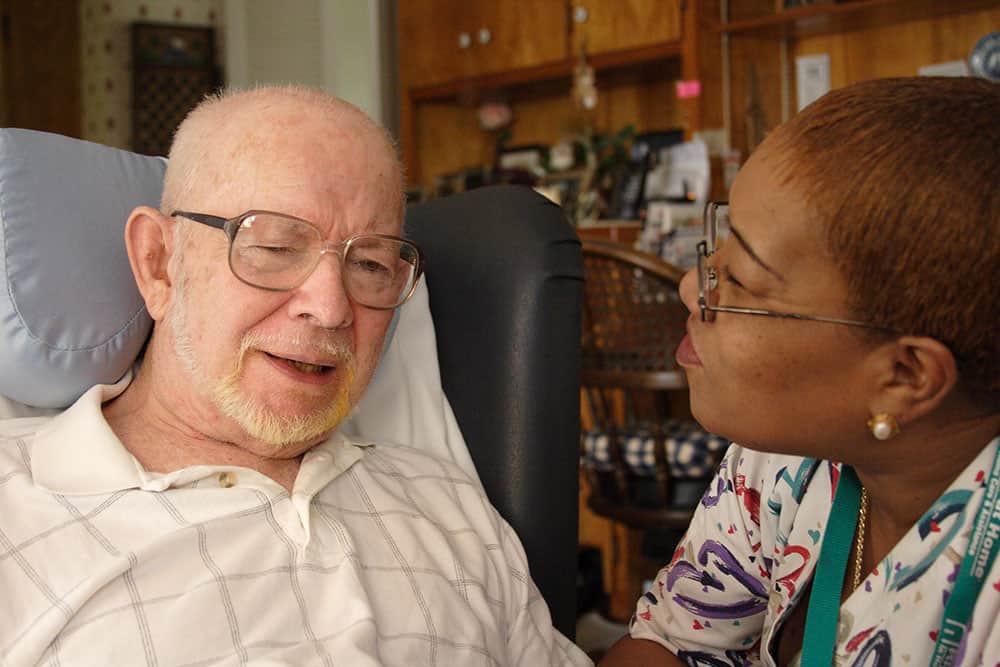
During the Middle Ages, the word “hospice” described a place where weary pilgrims could stop, rest and refresh themselves before continuing on their journey. In 1967, a British physician, Dr. Cicely Saunders, began using the term to mean a new kind of care for patients who were near the end of the journey of life. Patients came not to find a cure, but for support with managing pain and maintaining their quality of life, even in the face of a terminal illness. Today the hospice movement has spread around the world.
The best time to learn about hospice care is before we need it. Here are questions people often ask:
What services do hospice organizations provide?
Hospice addresses the physical, emotional and spiritual needs of people near the end of life. It also provides training, education and support for family members so they feel confident and supported in the caregiver role and prepared for the physical and emotional aspects around the end of life. Hospice services often include the following:
Comfort care (also called “palliative care”) helps patients feel better by treating the symptoms of their illness and side effects of treatment, such as pain, nausea, breathing problems, anxiety and other distressing symptoms. This usually includes medications. Hospice staff continually adjust a patient’s medications to keep the patient as comfortable as possible, while avoiding unnecessary drowsiness and confusion. Pain and discomfort can also be managed by other methods, such as massage, meditation, music, the use of cool or warm packs, and by properly positioning the patient to assist in soothing aches.
Nursing care includes monitoring the patient’s condition, caring for wounds, helping prevent skin problems due to immobility, and instructing family in the use of oxygen and medical equipment.
Physical, occupational and speech therapy can make the home environment safer and more comfortable, help the patient make the most of remaining abilities, and give family greater confidence when assisting their loved one.
The spiritual concerns of patient and family are also addressed. This might include religious discussions with the chaplain or activities that enhance the meaning of life during this time, such as music and art therapy.
Bereavement counseling helps families cope with grief both during the illness and after their loved one has passed away.
Where is hospice care provided?
“Hospice” is a type and philosophy of care, not a place. Most hospice services are provided where the patient lives, whether that is their own home, a loved one’s home, an assisted living community or nursing home. Sometimes hospice services are provided in a designated hospice center or hospital.
When should hospice care begin?
The decision to stop curative treatment is a decision to be made between patient and doctor. Hospice is recommended when the person is expected to live fewer than six months. Services can be helpful right away. Indeed, hospice care providers report the most common sentiment among families is: “We wish we had started sooner.”
Does selecting hospice care mean “giving up”?
This is one of the greatest myths about hospice care. Some people who are facing a life-limiting illness opt to continue curative treatment, even if this means discomfort and spending their last days in the hospital. Others choose to forego treatments that in all likelihood will not be successful and to focus on quality of life and comfort at this time. It is a very personal decision. As the Hospice Foundation of America puts it, hospice is the “something more” for people who have been told that nothing more can be done for them. And if a patient later wishes to change their approach from supportive care to a more aggressive or curative approach, they can revoke their choice to enter hospice care.
How is hospice paid for?
Medicare, Medicaid, the U.S. Department of Veterans Affairs and most private insurances cover hospice care. The hospice organization can help sort through the options. Patients without coverage may be helped through community and charitable contributions.
Who is on the hospice team?
End-of-life care is provided by a multi-disciplinary team of professionals who create a care plan that provides the greatest comfort and quality of life for the patient. The team usually includes the person’s personal physician, along with the hospice physician or medical director; nursing staff; home health aides; physical, occupational and speech therapists; social workers; pharmacists; chaplain; and counselors.
Professional caregivers also are an important part of the hospice team. They provide a soothing touch, a compassionate ear, and an extra pair of hands to take care of all the tasks that need doing.
Especially when patients are at home, family members truly head the team. As they care for their loved one, hospice focuses on their needs, too.
In-home care at the end of life
Hospice care is typically provided for a certain number of hours per week, with emergency assistance available 24/7. But when a patient lives at home, family members are left to provide most hands-on care. This care can by physically and emotionally challenging.
Nonmedical in-home care can be a good complement for hospice services. In-home care lightens the family’s load of day-to-day tasks, allowing them to spend more time focused on their loved one. A professional in-home caregiver can:
- Provide personal care, such as bathing, dressing and grooming.
- Safely care for and position the patient in bed.
- Help the patient transfer from bed to chair and to the bathroom.
- Do laundry, provide housekeeping and make the patient’s bed.
- Pick up prescriptions, go to the grocery store—whatever helpful errands are needed.
- Prepare meals and beverages as recommended by the hospice team.
- Provide companionship and the human touch.
- Stay with the patient so family can have some respite time.

This article was provided by Gregg Simons, Owner of Right at Home NYC. Mr. Simons and his Home Care company are Members of the National ElderCare Matters Alliance and have a Featured Listing on ElderCareMatters.com– America’s National Directory of Elder Care / Senior Care Resources to help families plan for and deal with the issues of Aging.
If you have additional questions about your family’s Elder Care / Senior Care Matters, you can count on ElderCareMatters.com (America’s National Directory of Elder Care / Senior Care Resources) to help you find America’s Top Elder Care / Senior Care Professionals. You can find Local Elder Care / Senior Care Experts by Searching our National Database by City and Service Category. (This Search feature is located on the homepage of ElderCareMatters.com).
The Elder Care / Senior Care Experts who are found on ElderCareMatters.com can provide you with the help you need in a wide range of Elder Care / Senior Care Services, including Elder Law, Estate Planning, Home Care, Assisted Living, Care Management, Daily Money Management, Senior Living, Investment Advisory Services, Tax & Accounting Services, Wills & Trusts, Probate plus many other Elder Care Services.
We look forward to helping you plan for and deal with your family’s Issues of Aging.
Visit ElderCareMatters.com.



